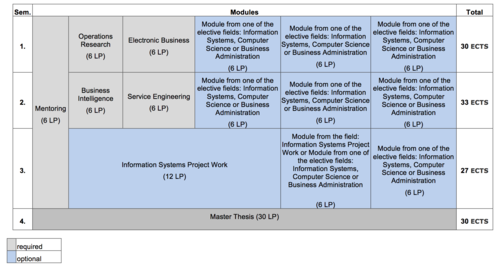Course Structure
Curriculum of the Master of Science in Information Systems
The Master's program primarily provides an understanding of the conception and use of information systems, relevant methods and challenges of information management, and current technologies. The modules, which correspond to a total workload of 90 ECTS, cover contents from sub-disciplines of business informatics such as information and business process management, applied operations research and business intelligence. A further 30 ECTS are completed as part of the master's thesis.
The modules are divided into a compulsory area (30 ECTS) and an optional area (60 ECTS).
Compulsory area
- Department of Business Information Systems (30 ECTS)
- Operations research
- Electronic business
- Business intelligence
- Service engineering
- Mentoring
Elective area
- Subject area business information systems (at least 6 LP)
- Subject area computer science (at least 18 LP, of which at least 6 LP from area I and 6 LP from area II)
- Subject area economics (at least 6 LP)
- Project work Business Information Systems (at least 12 LP)
A more detailed description of the objectives, contents and structure of the master's program in Business Information Systems can be found in the study and examination regulations (German). These regulations contain, among other things, the possible combinations of elective modules, detailed module descriptions and the exemplary study plan shown below. Please note that due to capacity constraints, not all elective modules listed in the study and examination regulations can always be offered for all cohorts. The participating professorships will inform you about the current courses offered.
Study and examination regulations apply subject to the approval of the senate administration responsible for higher education.
For further questions please refer to the FAQs and contact persons.

